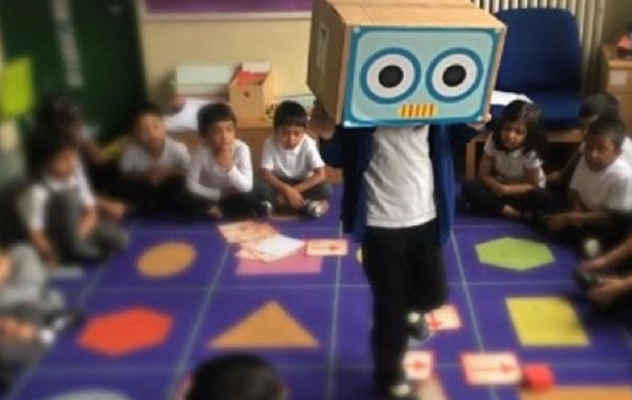
Image courtesy of Bradley Dardis @BradleyDardis
The introduction of the computing curriculum has increased demand for scarce IT resources. What can you do if the kit isn’t sufficient? In the fourth of our #nationalcodeweek series, we ask if it’s possible to learn computer programming without computers.
Many teachers are happy to teach algorithms without computers. Claire Wicher’s ‘favourite lesson’ is the jam sandwich robot, which emphasises the importance of accurate instructions and serves as a useful precursor to programming.
Donna Rawling recommends children programming each other to move around the playground, writing algorithms for everyday tasks, and unplugged logic activities. Whereas Laura gets children to write algorithms for playing cards – to extract all the odd cards, for example. Eliot Williams extends this idea to Top Trumps, great for sorting and searching.
Lecturer and computing educator Stuart Davison tells of the power of ‘code comprehension’, i.e. tracing output in sections of code, and asking students to explain what it does – asking them to take the role of the interpreter. Sue suggests some board games that can be utilised in the classroom, such as Roboturtles and Bits & Bytes. She uses mini-whiteboards while getting students to ‘act out’ what a program might be doing. Jon J Williams has students on their feet acting simulating tasks such as the fetch-execute cycle, so it ‘means more to them’.
Bradley Dardis states the role of ‘unplugged’ precursors to programming tasks:
“Sometimes the tech can overwhelm the concept being taught, its best to use an example and then highlight in coding”.
So, is it possible to teach programming, not just algorithmic thinking, without tech? Martin Caddy’s view is that it gives students time to focus on computational thinking, and to reflect on their learning. Simon Johnson cautions against over-using unplugged activities, as they can be rather too abstract. He recommends the compromise measure of programming children using cut-out, laminated Scratch blocks, although Urban Teacher points out the prep-time required can be a barrier.
Of course, to write and execute computer code, you need a computer. Programming without one? The final word goes to Simon Walters:
“Really, just don't. Even the dimmest SLTs understand that to teach coding, you need coding devices - get some”
More from this series...
- National Coding Week: When is the best time to move from blocks to text-based programming?
- National Coding Week: how to teach programming when your confidence is low
-
National Coding Week: what are your go-to resources when teaching programming for the first time?
You may also be interested in...
- Data representation in key stage 3 computing with CAS Tenderfoot
- Algorithms in A Level computer science
- Algorithms in GCSE computer science
- Assessment and progression in primary computing
